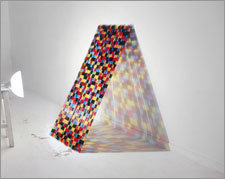Laurent Millet
dal 12/5/2010 al 18/7/2010
Segnalato da
12/5/2010
Laurent Millet
Robert Mann Gallery, New York
The Last Days of Immanuel Kant. The title of the exhibition is taken from Thomas de Quincey's novella of the same name, in which the narrator describes the declining health and diminished perceptual faculties of the eminent philosopher, rendering Kant less capable of interpreting the world around him. Millet takes Kant's waning powers as the inspiration for his own explorations of phenomenological doubt.

With his whimsical constructions, Laurent Millet challenges our initial perceptions, applying analogue means to create stunning affects. Developing out of his series Les Zozios, exhibited at Robert Mann Gallery in 2005, the works in The Last Days of Immanuel Kant are ephemeral sculptural tableaux made only to be photographed. Millet has often explored the uncanny effect of translating objects to images, at times playing on the two dimensional surface of the photographic image and its capacity to render realistic spatial depths. His studio serves as both playground and workshop — a place of aesthetic and philosophical investigation.
The title of the exhibition is taken from Thomas de Quincey's novella of the same name, in which the narrator describes the declining health and diminished perceptual faculties of the eminent philosopher, rendering Kant less capable of interpreting the world around him. Millet takes Kant's waning powers as the inspiration for his own explorations of phenomenological doubt. For all of their pleasurable optical revelations, Millet's constructions are hardly the effects of a naïve dabbler, but rather make knowing and winking reference to a wide-range of Modernist art and scientific discoveries. From Tatlin's Constructivist reliefs to molecular models: against this matrix of signs, Millet's work evinces a critical doubt and wonder at our ability to understand and perceive the world around us in any objective fashion.
Millet's images revel in the deceptions and revelations of sculptural form. But rather than emphasizing the material weight of his constructions, the dominant effect is of light and color intervening in the specific spaces of their construction. The sheer white walls, floor, and furniture of the archetypal studio create a sort of depthless blank slate for explosions of color (or alternatively a nearly desaturated achromaticity). Recalling Dan Flavin's fluorescent light tube installations or Calder's wire constructions, Millet's ephemeral forms interrogate the particulars of the space they occupy. Other works in the exhibition continue this interest in spatial illusionism and rendering of architectural space. In Les Vacances de Dusseldorf, a suite of nine hand-painted photographs, it appears that the artist has created simple drawings of buildings on top of the photographic surface; in fact the linear framework of the sketch is rendered using yarn in three dimensions within his studio. Only as an (over-painted) photograph does it achieve it's intended trompe-l'oeil effect.
The Last Days of Immanuel Kant is Laurent Millet's fourth solo exhibition at Robert Mann Gallery. In 2009 he presented a solo exhibition at the Rencontres d'Arles, and has been in recent shows at the Museum of Contemporary Photography, Chicago and the Museé Malraux, Le Havre. Millet's work is included in the collections of the Los Angeles County Museum of Art, the Art Institute of Chicago, the San Francisco Museum of Modern Art, and the Bibliothèque Nationale de France. Born in 1968, he lives in Rochefort, France.
Opening May 13, 2010
Robert Mann Gallery
210 Eleventh Avenue - New York NY
Hours: Tuesday-Saturday 11am-6pm



